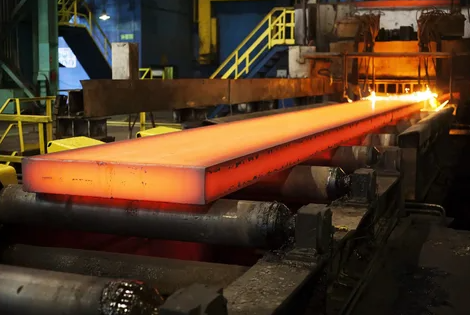Steel equipment maker Tenova is partnering with Italian energy companies De Nora, Snam and other European steelmakers to test green hydrogen to decarbonize steel production. This is happening as part of the project “Hybrid Technologies for Sustainable Heating of Steel” (HyTecHeat).
HyTecHeat, funded by the European Commission with a budget of around €3.3 million ($3.5 million), will test hybrid heating technologies based on natural gas, gradually increasing the hydrogen content to 100% in downstream processing.
The firm will install an electrolyser at its Italian headquarters in Castellanza, which will test industrial burners. “Three demonstrations testing innovative multi-fuel burners will support the transition to hydrogen in the steel sector, paving the way for the reduction of Scope 1 CO2 emissions... One of the demonstration projects in which Tenova is involved focuses on system integration between off-the-shelf burners hydrogen fuel, electrolyser and storage systems,” explains Tenova.
Snam will provide the hydrogen storage system, and De Nora will supply a new electrolyser called Dragonfly. In addition to the burners, the tests will cover the entire production process, from clean energy production to the photovoltaic system, hydrogen production and storage, process control and safety issues.
The project is a response to the need to develop industrial-scale technology that includes the production, storage and use of renewable hydrogen in thermal combustion processes.
However, some steel industry sources believe that producing and storing green hydrogen is currently too expensive a technology to decarbonize steel production.
Despite investing in hydrogen companies through its "XCarb" innovation fund, ArcelorMittal said in 2021 that decarbonizing steel using other carbon capture technologies has so far proven to be more effective and less costly.
ArcelorMittal Europe chief executive Geert van Poelvoorde last month reiterated that the use of green hydrogen would push steelmakers out of the market in the short term due to their lack of competitiveness (see Kallanish passim).
Antonio Gozzi, owner of Duferco, previously said decarbonized gas could be the best and most achievable solution for Italy's energy independence and cheap energy for industry and households. Gas prices could fall significantly in the coming years due to weaker future demand in Europe and huge supplies in the Mediterranean, where giant deposits will make it widely available. Gas could be cheaply imported into Italy from countries such as Algeria, Egypt, Israel or Cyprus.
An industrialized country like Italy needs baseload energy in addition to intermittent renewable sources, Gozzi said. Producing green hydrogen requires huge amounts of renewable energy and water, which is a valuable and rare commodity, he added.
Subscribe to news 
Metallurgy news
- Today
11:00 10:00 ArcelorMittal Hunedoara has approved the sale of all assets of UMB Steel for €12.5 million 09:00 Heavy truck sales in China will increase by 26 percent in 2025 - 03 January 2026
00:00 Brazil's largest HDG plant to begin operations in January - 02 January 2026
17:00 The Italian antitrust authority closed the investigation into the cast iron cartel and imposed a fine of 70 million euros. 16:00 India imposes temporary AD duty on coke imports from six countries 16:00 In January-November 2025, the value of exports of non-ferrous metals from South Africa decreased by 20.2 percent. 15:00 The US has set a zero dumping margin on welded pipeline pipes from South Korea
Publications
30.12 Sprinklers for tractor 26.12 Keratin for hair care restoration and protection 25.12 Diode lasers from Alvi Prague 25.12 Services of the exporter of Budivelny Smith 24.12 old furniture - how to dispose of it correctly






